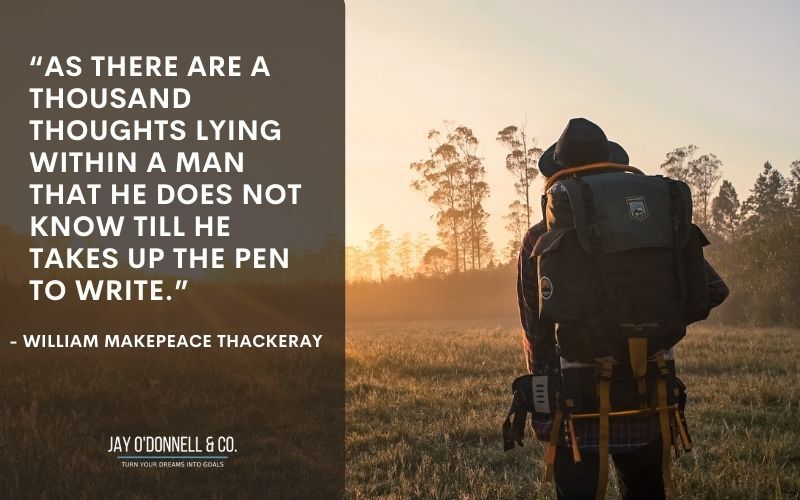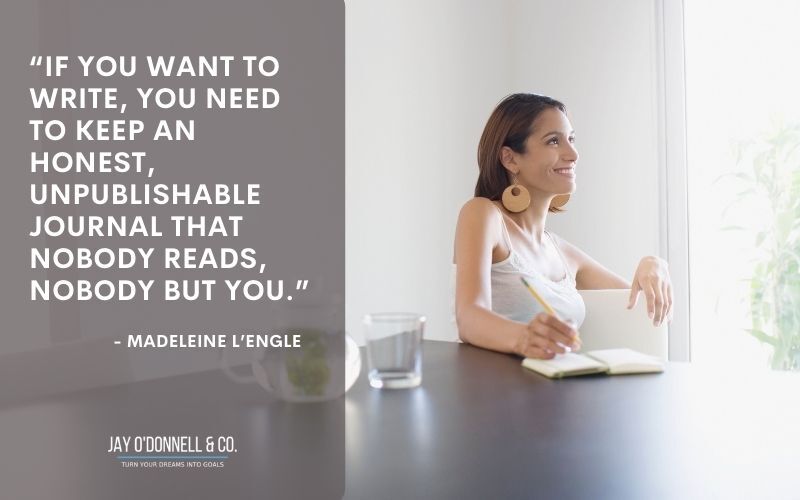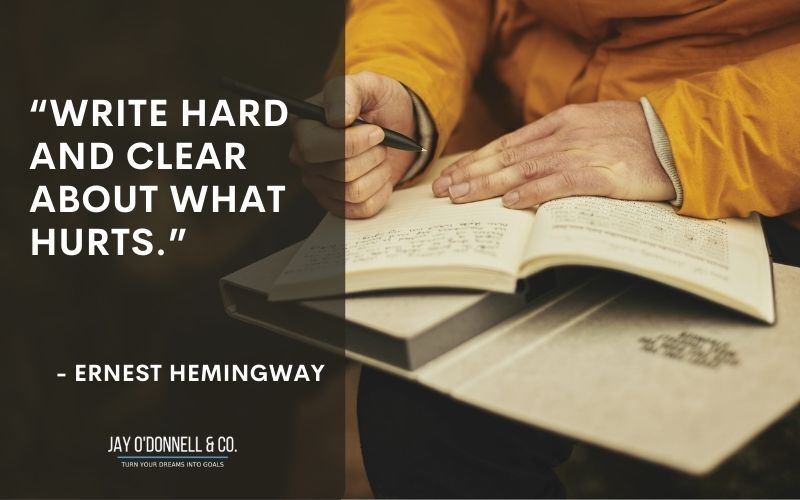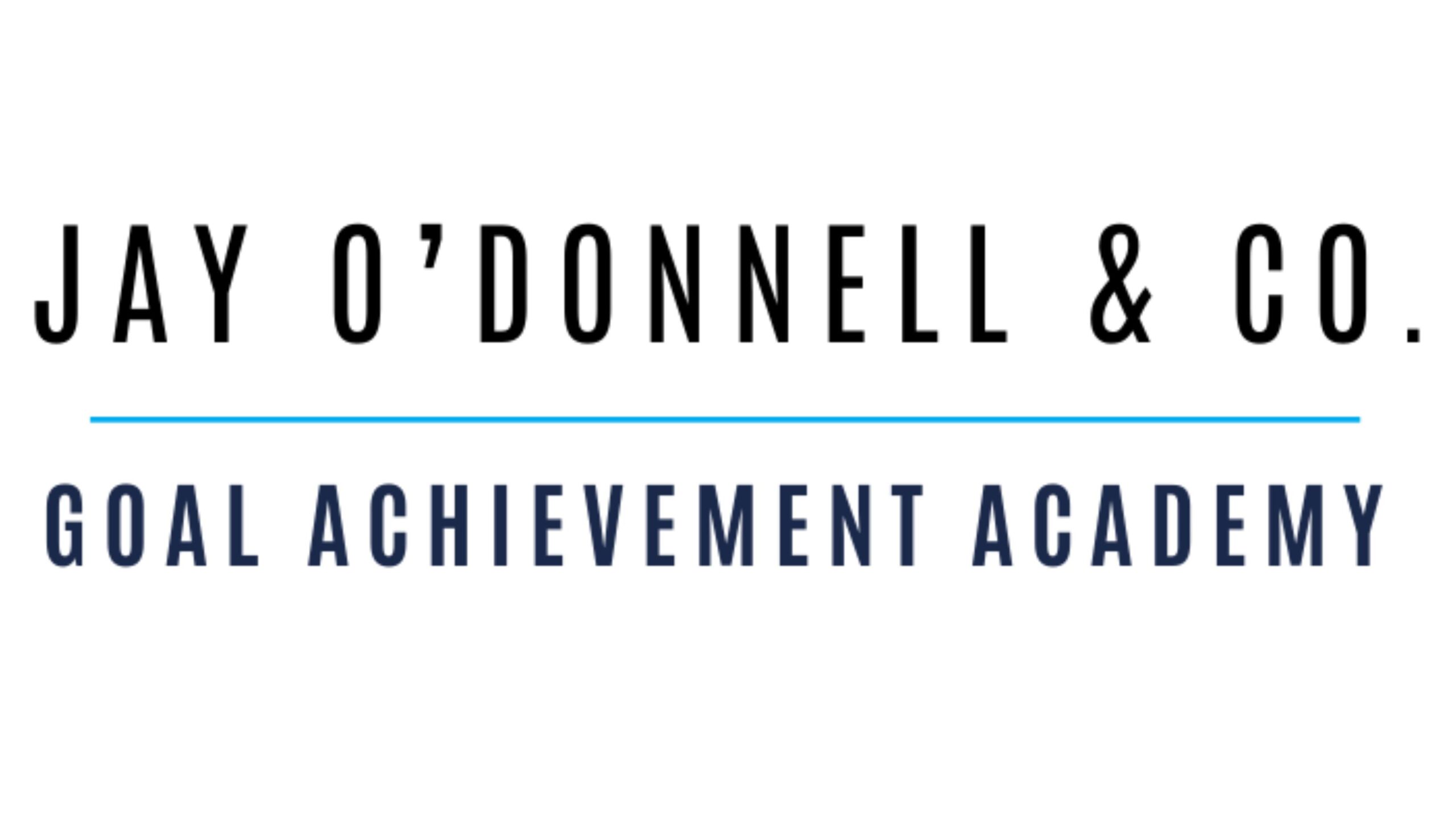Are you trying to figure out how to start journaling?
Journaling is one of those habits/activities that a lot of people believe in and see as beneficial, but that very few people actually take the leap to begin or stick with.
And the reason for this is pretty simple.
A journaling habit needs to be exactly that—a habit.
The truth about journaling is that it’s really useful.
In fact, journaling can be incredibly helpful in the process of dreaming big dreams and turning those dreams into goals, to help you achieve success for yourself in life.
I’ve had a journaling habit off and on for over 30 years at this point, and it’s been incredibly beneficial.
However, there are a few steps that are helpful to keep in mind—steps that can help you to learn how to start journaling while also providing you with your best possible odds for making it the successful, satisfying, fulfilling habit that it was intended to be.
So let’s jump into the process.
This is my no-nonsense, in-depth guide on how to start journaling.
What Is Journaling?

Journaling is basically the act of recording information about your life. You can use your journaling practice as a tool for reflection, self-awareness, and tracking results.
Journaling is a very creative and open-ended process.
For example, you could journal about your thoughts or feelings. You could journal about your experiences in life. You can journal about things like the weather, the temperature, the humidity, etc.
You could journal about a particular journey towards a particular goal.
You could start a relationship journal, or you could just journal about anything you want to write or think about on any particular day.
There doesn’t even have to be a set format to it.
In fact, this is where a lot of people tend to go wrong with journaling.
They tend to try to stick too stringently to some kind of pre-meditated, structured journaling format.
But what this sometimes ends up doing is squashing the creative energy and working against the fulfillment that can come from it being a creative and free-flowing process.
Granted, there are a lot of benefits to sticking with a structured journaling outline or template.
However, it’s also true that things change, feelings change, and emotions change. Thus, every day is different.
You may care more about writing down some specific things on some days than you do on other days—and this is totally normal.
Why Should You Start Journaling?
There are many benefits to journaling.
There are actually a lot of health benefits to it that I won’t dive too deeply into in this post, but you can read about them here.
What I would like to discuss in this post, however, are the benefits that it can bring to the process of pursuing and achieving your life goals.
See, journaling helps you to record thoughts, feelings, emotions, reflections, and data that you acquire while you’re on your life journey.
Recording this information can be therapeutic and helpful in and of itself, because it gives you a medium where you can be completely honest and just say what’s on your mind.
It’s almost like self-therapy.
It’s also kind of like a form of meditation.
But it can also give you a tremendous amount of clarity on where you’ve come from, where you’re going, and what progress you’ve made.
Journaling can help you to understand your passion and purpose in life.
Plus, it can help you to understand the challenges and struggles you’re going through in the current moment—and all of this is incredibly useful.
How To Start Journaling – In 7 Simple Steps
Alright. Now, let’s dive into the nitty-gritty of it, and talk about exactly how to start a journaling habit that actually works for you.
1. Choose A Journal

In order to start journaling, you’re going to want to choose a journal.
Now, journals come in a wide range of different types and styles.
For the most part, they tend to be undated and blank.
They’re almost like fancier blank notebooks.
In fact, you can even use a blank notebook to start a journaling habit.
You don’t have to be fancy about it.
However, I’ve found that buying a really nice journal (perhaps a journal with leather binding that boasts a nice rugged or modern ‘look’ to it) that feels good in your hands, that includes some high-quality paper on the inside, that makes you feel creative, is particularly useful.
This will help you to look forward to the goal of journaling and believe in it more.
Choosing a journal is really the first step. But next, you’ll have to actually write some stuff down.
2. Make It A Daily Habit
In the process of learning how to start journaling, you’re going to want to commit to the habit on a daily basis.
This is the important part—because daily journaling is really where you derive maximum value from the process.
Now, within this framework, you can be as stringent or as lax with the actual flow of the journaling itself as you feel like being.
For example:
On day one, you may feel like writing three entire pages filled with information about how you felt about your journey that day.
But on day two, you may only feel like writing three sentences.
And that’s perfectly fine.
The key isn’t to write a bunch of stuff every day; or to even write the same amount of stuff every day.
The key is to just record something in your journal every day.
Even if you just write one sentence—the fact that you opened your journal, wrote something in it, and then closed it to finish the process that day is incredibly beneficial.
The reason for this is because journaling is most useful and provides the greatest benefit when you commit to it on a daily habit basis.
So every single day, try to commit to at least opening your journal, writing down the date, and writing down at least one sentence (or even drawing a picture) about something that happened that day.
Then, you can close the journal and put it away.
On days when you feel more creative, and when you have more energy for journaling, you can flesh it out a bit more and record more information.
This is the beauty of journaling.
There’s no right or wrong way to do it.
You get to choose how you want to utilize it. And you can structure the habit to help provide a maximum benefit for your life.
3. Let Go Of Perfection

Sometimes, people neglect their journaling habit because they’re afraid that it’s not going to be perfect.
They may have preconceived ideas about exactly how they want their journal entries to look, sound, or feel.
But here’s the thing.
Perfectionism will really keep us from doing the things that matter most.
It’s vitally important for you to understand that, at the core, journaling is the most successful when you let go of perfectionism and just be yourself.
Just be human—with all of your imperfections, unique traits, and personality quirks.
Don’t let perfectionism keep you from enjoying the benefits that journaling has to offer.
4. Say The Most Important Things First
Another common stumbling block with journaling is that sometimes people want to begin the process, but aren’t sure what to say when they actually open up the journal.
This is more common than you might think.
But there’s a very simple solution to it.
Just start by writing down the very first thing that comes to mind.
For example, I once had a goal-setting student who used to run into this problem a lot.
And his solution was simple.
When he opened his journal, if he didn’t feel like he had anything to say, he would simply start out by saying this:
“Today, I don’t feel like I have anything to say.”
Then, he would just write down the next sentence that popped into his mind.
Then, he would write down the next sentence—and so on.
He didn’t try to stick to any particular plan or format.
He completely let go of the need to try to do it perfectly, or to stick to some kind of rigid template.
And guess what?
On those days, when he started off feeling like he had nothing to say—those days ended up being the days where he sometimes recorded four or five pages worth of thoughts.
Because once he actually got started and overcame that barrier of just writing something down, the thoughts, feelings, and emotions would pour out onto the page in a very natural, free-flowing way.
Of course, your process may look slightly different.
Just remember that if you’re not sure what to say—just say the most important thing first, or the thing that pops into your mind first.
This is the best way to overcome this barrier.
5. Be Radically Honest With Yourself

Your journal isn’t necessarily something that other people are going to read, see, or access.
In fact, you may decide that you want to keep everything written in your journal a secret.
And to be honest, that may be the best thing to do.
Because the best journaling progress comes when you allow yourself to be completely honest and free about what you want to say and record for yourself.
6. Allow The Process To Evolve Over Time
As you begin the process of writing down journal entries, you may quickly find that your process will change and adapt.
You may start out by just writing simple sentences about your feelings and thoughts.
But over time, this may shift.
You may begin recording detailed, data-driven accounts of your journey towards success—or the pursuit of one of your goals.
And this may cause you to change your journaling habits completely.
Your journaling habits may even change with the seasons, or even with different phases of life—and this is all a good thing.
Try not to resist the urge to change your journaling habits as your life changes, or even as you get more experience journaling.
Remember that life is a process filled with change and evolution.
You absolutely have the power to change your journaling habits over time without sacrificing the value of the habit itself.
In fact, this is how you make your journaling habit even more useful and beneficial for you.
It’s all open-ended and creative.
Don’t let preconceived notions hold you back from changing the process in ways that are beneficial for you.
7. Use Journal Prompts If You’re Feeling Stuck
If you start to feel stuck in a journaling habit, you may want to think about finding some useful journaling prompts to help you get started.
You can find a list of awesome journaling prompts here.
If you’re not sure what to write down, open a list of prompts, find one that triggers a feeling, thought, or emotion within you, and then just start writing.
Prompts are an awesome way to inspire creativity and invoke imagination.
So feel free to use them. It’s definitely not cheating.
Conclusion
Hopefully, this post has helped you to understand now only how to start journaling, but also how you can get started on the process (using these 7 simple steps) today.
Of course, at the end of the day, finding a journaling habit that works for you is just another part of the larger, overarching process of turning your dreams into goals, and writing those goals down to create a roadmap for success in your life.
But at the end of the day, the system that you choose is never as important as just deciding to get started.
This is how you begin your journey to success and crush it.
Need some help? Download my weekly goal-setting sheet, print out a few, and give it a try.
You can also sign up for my email list to get a free copy of my Goal Setting Essentials Starter Kit.
You’ve got this. I believe in you.
Now it’s time to get to work.
Best wishes…
Jay O’Donnell

